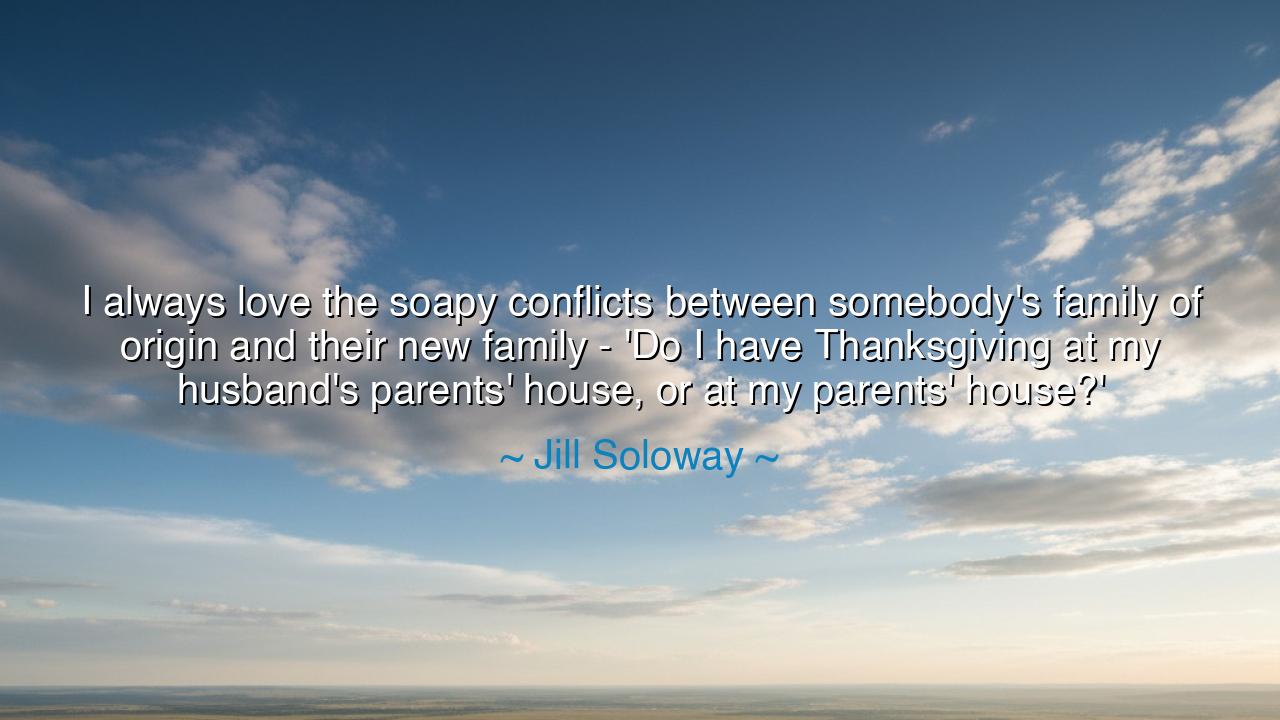
I always love the soapy conflicts between somebody's family of
I always love the soapy conflicts between somebody's family of origin and their new family - 'Do I have Thanksgiving at my husband's parents' house, or at my parents' house?'






Jill Soloway, with insight sharpened by storytelling, once said: “I always love the soapy conflicts between somebody's family of origin and their new family—‘Do I have Thanksgiving at my husband's parents' house, or at my parents' house?’” Though spoken with a touch of humor, her words uncover an ancient and universal truth: the tension between loyalty to the family of one’s birth and devotion to the family one builds anew. This conflict, though often wrapped in trivial decisions about holidays and meals, reflects the deeper struggle of human beings caught between past and present, between tradition and new beginnings.
The origin of this reflection lies in the lived experiences of countless marriages and unions across generations. From the moment one binds their life to another, there arises the question of divided allegiance. The family of origin—parents, siblings, the house of childhood—still claims love and loyalty. Yet the new family, formed through marriage or partnership, demands its own place of honor. This tug-of-war often plays out most visibly during festivals and holy days, such as Thanksgiving, where presence at the table is seen as both a sign of love and a fulfillment of duty.
History gives us many mirrors of this dilemma. In ancient Israel, Ruth the Moabite faced such a choice. After her husband died, she could have returned to her own people, her family of origin. Instead, she chose her new allegiance, uttering the immortal words: “Where you go, I will go; your people shall be my people.” Her story illustrates the gravity of such decisions. Choosing where to feast, where to belong, and whom to honor is not simply a matter of meals—it is the shaping of destiny.
Even in more recent times, the history of immigrants reveals the same struggle. Families who crossed oceans often found their children torn between honoring the traditions of their ancestral homes and embracing the customs of their new land. A daughter might marry outside her heritage, and the question would arise: “Do we celebrate in the old way, with our parents, or in the new way, with our spouse’s family?” These soapy conflicts, as Soloway calls them, are not trivial—they are the fabric of cultural change, the crossroads where identity is negotiated.
There is also hidden wisdom in Soloway’s playful tone. She names these moments as “soapy,” for they often swell with drama beyond their true weight. Families quarrel, tears are shed, loyalties are questioned—all over a single holiday meal. Yet behind the soap opera lies the deeper truth: such disputes reveal the fierce importance of belonging. To be present at the feast is to affirm love. To be absent may feel like rejection. These conflicts, however small in appearance, are windows into the heart’s need for recognition and closeness.
The lesson for all who hear is profound: do not let loyalty wars destroy the joy of family. Instead of choosing one love over another, strive to build bridges. Rotate holidays, combine gatherings, or create new traditions of your own. Teach your children that family is not a battlefield but a circle, wide enough to hold many tables. Where there is love, there should not be rivalry, but shared gratitude.
Practical wisdom follows: when faced with such decisions, speak openly, with kindness and humility. Honor your family of origin, for they gave you life, but also honor your new family, for it is the future you are building. Seek compromise rather than conflict. If presence is impossible, let words, gifts, and visits at other times carry your devotion. What matters most is not the exact place where you eat, but the spirit of love with which you remember and honor both sides.
Thus, Jill Soloway’s words, though cast in humor, become an eternal teaching. The drama of whose table we choose reflects the greater drama of human life: how to balance past and future, how to honor both roots and branches. Let every generation learn to handle this conflict not with resentment, but with reverence and creativity. In doing so, the feast will no longer be a point of division, but a testament to love’s power to unite.






AAdministratorAdministrator
Welcome, honored guests. Please leave a comment, we will respond soon